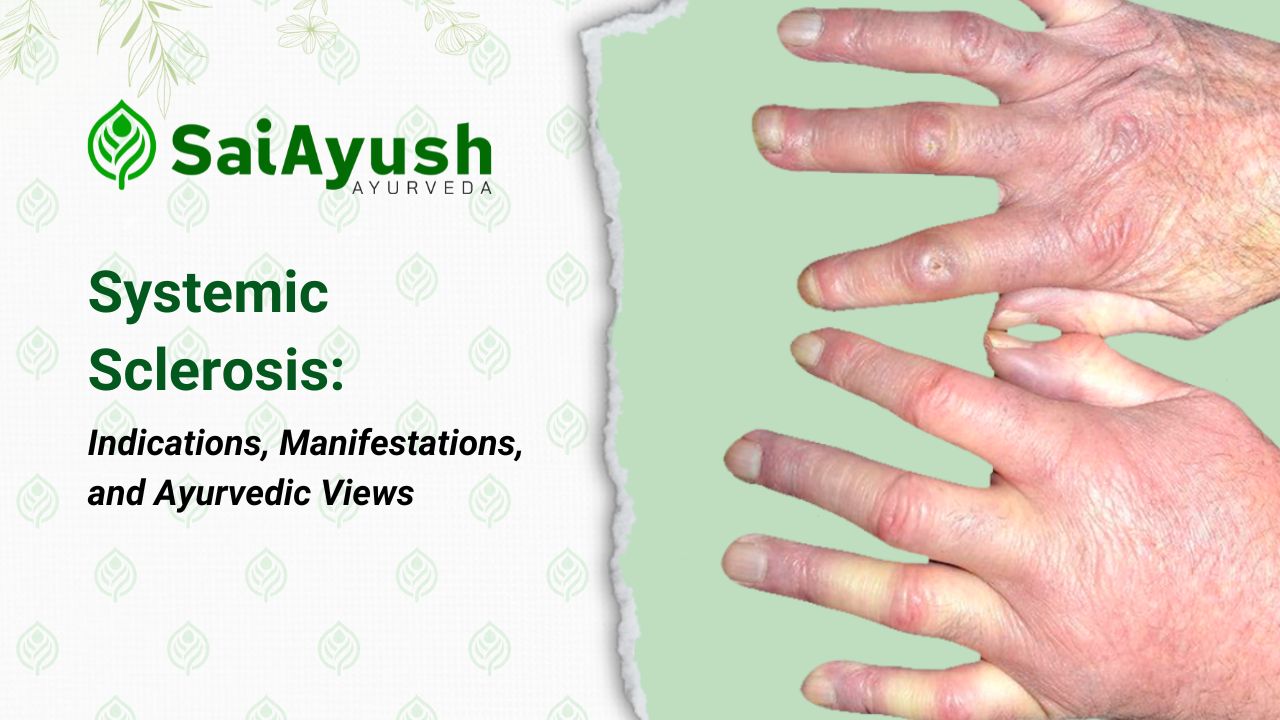Introduction
Hello everyone! Today, I want to take you on a journey to understand a complex and often misunderstood condition called systemic sclerosis. We’ll dive deep into its signs and symptoms, explore perspectives in Ayurveda, and discover various Ayurvedic treatments. I’ll also share some preventive measures to help manage this condition.
What is Systemic Sclerosis?
Systemic sclerosis, also known as scleroderma, is an autoimmune disorder characterized by the hardening and tightening of the skin and connective tissues. This condition can affect various parts of the body, including internal organs, leading to a range of complications. Understanding its signs and symptoms is crucial for early diagnosis and effective management.
What are the Signs and Symptoms of Systemic Sclerosis?
The signs and symptoms of systemic sclerosis can vary significantly from person to person, depending on the organs affected. Here are the most common symptoms:
Skin Changes
- Tightening and Hardening: The skin becomes tight, thick, and hard.
- Shiny Appearance: Affected skin areas may look shiny.
- Limited Mobility: Stiffness in the skin can limit the movement of affected areas.
Raynaud’s Phenomenon
- Cold Sensitivity: Fingers and toes turn white or blue in response to cold temperatures or stress.
- Pain and Numbness: Affected areas may become painful or numb.
Digestive Issues
- Difficulty Swallowing: Hardening of the digestive tract can cause swallowing difficulties.
- Acid Reflux: Commonly experienced due to esophageal involvement.
- Malabsorption: Reduced absorption of nutrients in the intestines.
Respiratory Problems
- Shortness of Breath: Due to lung involvement.
- Dry Cough: Persistent and can indicate lung fibrosis.
Joint and Muscle Pain
- Arthritis: Inflammation in the joints.
- Muscle Weakness: Common in later stages.
Kidney and Heart Issues
- Hypertension: High blood pressure due to kidney involvement.
- Heart Failure: Can result from the thickening of heart tissues.
Perspective in Ayurveda
Ayurveda, the ancient Indian system of medicine, offers a holistic approach to managing systemic sclerosis. According to Ayurveda, systemic sclerosis is believed to be caused by an imbalance of the body’s doshas (Vata, Pitta, and Kapha).
Treatments in Ayurveda
Ayurveda focuses on restoring the balance of doshas through a combination of internal and external treatments. Let’s explore these treatments:
Internal Treatments
1. Herbal Remedies
- Turmeric (Curcuma longa): Known for its anti-inflammatory properties.
- Ashwagandha (Withania somnifera): Helps in reducing stress and inflammation.
- Guduchi (Tinospora cordifolia): Enhances immunity and reduces symptoms.
2. Dietary Adjustments
- Balanced Diet: Emphasizes fresh fruits, vegetables, whole grains, and lean proteins.
- Avoid Cold Foods: Prefer warm, cooked foods to aid digestion.
- Hydration: Drink plenty of warm water throughout the day.
External Treatments
1. Panchakarma Therapy
- Abhyanga (Oil Massage): Using medicated oils to improve circulation and skin health.
- Swedana (Steam Therapy): Helps in detoxifying the body and reducing stiffness.
- Basti (Enema Therapy): Cleanses the colon and balances Vata dosha.
2. Local Applications
- Lepanam: Applying herbal pastes on affected areas to reduce hardness and inflammation.
- Udwarthanam: A therapeutic deep tissue massage using herbal powders to exfoliate and rejuvenate the skin.
Preventive Measures
Preventive measures can help manage systemic sclerosis and improve the quality of life. Here are some tips:
Lifestyle Modifications
- Regular Exercise: Engages in low-impact exercises like yoga and walking to maintain mobility.
- Stress Management: Practices such as meditation and pranayama (breathing exercises) to reduce stress.
- Skin Care: Keep skin moisturized and protected from extreme temperatures.
Dietary Tips
- Anti-inflammatory Foods: Include foods rich in omega-3 fatty acids like flaxseeds and walnuts.
- Avoid Triggers: Stay away from foods that cause inflammation, such as processed foods and sugars.
- Spices: Incorporate anti-inflammatory spices like turmeric and ginger into your diet.
Regular Check-ups
- Monitor Symptoms: Regularly monitor symptoms and seek medical advice promptly.
- Holistic Approach: Combine conventional treatments with Ayurvedic practices for better outcomes.
Conclusion
Systemic sclerosis is a challenging condition, but with the right knowledge and approach, it can be managed effectively. Ayurveda offers a holistic perspective that addresses the root cause and provides comprehensive treatment options. By following preventive measures and integrating Ayurvedic practices, one can improve their quality of life and manage systemic sclerosis more effectively.
FAQs
What are the early signs of systemic sclerosis?
Early signs include skin tightening and hardening, Raynaud’s phenomenon, and digestive issues like acid reflux.
How does Ayurveda help in managing systemic sclerosis?
Ayurveda helps by balancing the body’s doshas through herbal remedies, dietary adjustments, Panchakarma therapy, and lifestyle modifications.
What are the internal treatments for systemic sclerosis in Ayurveda?
Internal treatments include herbal remedies such as turmeric, ashwagandha, and guduchi, along with dietary adjustments emphasizing fresh and warm foods.
What are the preventive measures for systemic sclerosis?
Preventive measures include regular exercise, stress management, skin care, a diet rich in anti-inflammatory foods, and regular medical check-ups.
Can lifestyle changes help manage systemic sclerosis?
Yes, lifestyle changes such as regular exercise, stress reduction, and a balanced diet can significantly help in managing systemic sclerosis.
I hope this comprehensive guide provides valuable insights into systemic sclerosis and how Ayurveda can offer effective management strategies. If you have any questions or need further information, feel free to reach out. Stay healthy and balanced!
Discover the healing power of Ayurveda with our latest article at Sai Ayush Ayurveda Hospitals! Dive into the age-old wisdom that can rejuvenate your body and mind. Click here to read more:



